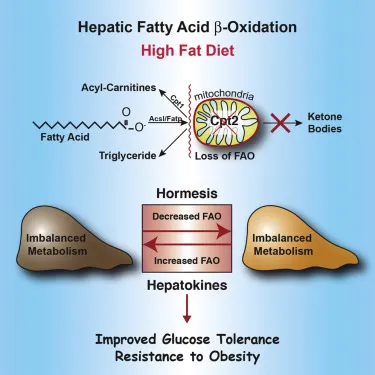The Role of Fat Oxidation in Maintaining a Healthy Liver
Introduction
The liver is a vital organ in the human body responsible for various functions, including detoxification, metabolism, and the production of important proteins. One of the key factors in maintaining a healthy liver is the process of fat oxidation, which plays a crucial role in ensuring proper liver function. In this article, we will explore the importance of fat oxidation in liver health and how it can help prevent liver diseases.
What is Fat Oxidation?
Fat oxidation, also known as fat burning or lipid metabolism, is the process by which the body breaks down fats into fatty acids and converts them into energy. This process occurs in the mitochondria of cells, where fats are broken down through a series of chemical reactions to produce adenosine triphosphate (ATP), the primary source of energy for cells.
The liver is a major site of fat oxidation, as it plays a key role in processing and storing fats from the diet. When the body has excess fat stores, the liver converts these fats into fatty acids and then oxidizes them to produce energy. This energy is used to fuel various metabolic processes in the body, including the synthesis of proteins, the production of hormones, and the maintenance of body temperature.
Importance of Fat Oxidation in Liver Health
Maintaining a healthy liver is crucial for overall health and well-being. The liver plays a key role in regulating blood sugar levels, detoxifying harmful substances, and producing essential proteins. Fat oxidation is essential for liver health for several reasons:
1. Preventing Fatty Liver Disease: Fatty liver disease is a condition characterized by the accumulation of fat in the liver, which can lead to inflammation and scarring of the liver tissue. Fat oxidation helps prevent fatty liver disease by breaking down excess fats and preventing their accumulation in the liver.
2. Regulating Blood Sugar Levels: Fat oxidation plays a key role in regulating blood sugar levels by converting fatty acids into energy. When blood sugar levels are too high, the liver can convert excess glucose into fat for storage. Fat oxidation helps prevent the buildup of fat in the liver and maintains optimal blood sugar levels.
3. Supporting Detoxification: The liver plays a crucial role in detoxifying harmful substances, such as alcohol, drugs, and environmental toxins. Fat oxidation provides the energy needed for the liver to carry out detoxification processes effectively and remove toxins from the body.
4. Maintaining a Healthy Weight: Fat oxidation is essential for maintaining a healthy weight and preventing obesity. When the body has excess fat stores, the liver converts these fats into energy through oxidation. By promoting fat oxidation, the liver helps regulate body weight and prevent the development of obesity-related conditions.
FAQs
Q: How can I promote fat oxidation in my liver?
A: You can promote fat oxidation in your liver by following a healthy diet rich in fruits, vegetables, whole grains, and lean proteins. Regular exercise can also help promote fat oxidation by increasing energy expenditure and promoting the breakdown of fats.
Q: Are there any supplements that can support fat oxidation in the liver?
A: Some supplements, such as carnitine, green tea extract, and omega-3 fatty acids, have been shown to support fat oxidation in the liver. However, it is important to consult with a healthcare provider before taking any supplements to ensure they are safe and effective for you.
Q: Can fat oxidation in the liver prevent liver diseases?
A: Fat oxidation plays a key role in preventing fatty liver disease by breaking down excess fats and preventing their accumulation in the liver. By promoting fat oxidation, you can help maintain a healthy liver and reduce the risk of developing liver diseases.
Conclusion
Fat oxidation plays a crucial role in maintaining a healthy liver by providing the energy needed for various metabolic processes and preventing the accumulation of fats in the liver. By promoting fat oxidation through a healthy diet and regular exercise, you can support liver health and reduce the risk of developing liver diseases. Consult with a healthcare provider for personalized recommendations on how to promote fat oxidation and maintain a healthy liver.


